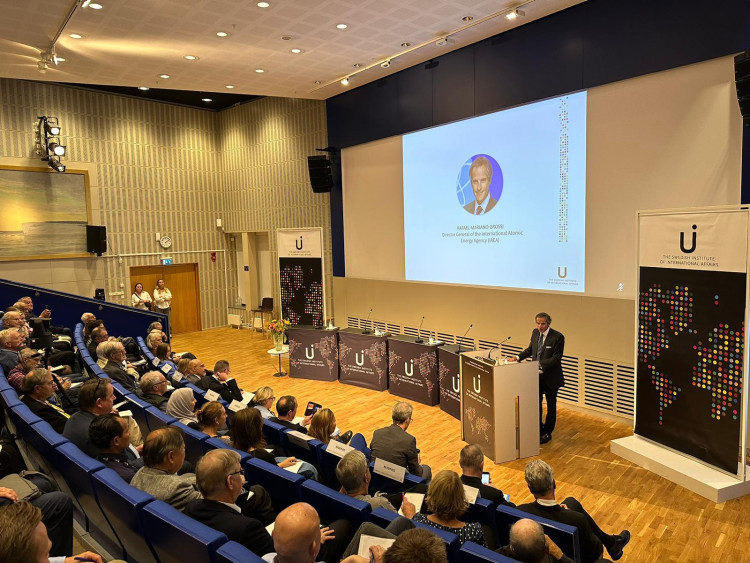
IAEA Director General Rafael Mariano Grossi spoke about nuclear-related issues including Ukraine, Iran and the DPRK, at the Swedish Institute of International Affairs. (Photo: IAEA).
Amid significant interest from policymakers, analysts and academics in the IAEA’s work on topical nuclear-related issues including Ukraine, Iran and the Democratic People’s Republic of Korea (DPRK), he also participated in two high-level panel and round table discussions – at the Swedish Institute of International Affairs (UI) and the Stockholm International Peace Research Institute (SIPRI), where he met with one of his predecessors, Hans Blix.
Sweden first introduced nuclear power in the 1960s and 1970s, and currently operates six reactors at three sites, supplying nearly a third of its electricity, with hydro providing much of the rest in its fossil-free energy mix. This represents half of the 12 reactors that generated electricity a quarter of a century ago, but the government that took office after last year’s general election has made clear its aim to reverse this declining trend and expand the role of nuclear power in the coming two decades, implementing legal changes aimed at paving the way for such an energy transformation.
“For more than half a century, Sweden has been one of the leaders internationally when it comes to nuclear technology. It is now taking steps to facilitate a new expansion phase to meet an anticipated rapid growth in the demand for electricity to power its economy. It is a frontrunner in the clean energy transition, already relying almost exclusively on nuclear, hydro and renewables for its energy needs,” Director General Grossi said.
“My discussions in Stockholm with senior government, regulatory and industry officials have demonstrated a shared understanding that the world needs more nuclear energy to be able to fight the climate crisis effectively. Reliably generating dispatchable power 24/7, nuclear is an ideal partner to wind and solar,” he said. “The IAEA is following developments in Sweden with great interest and stands ready to provide any support that may be requested. I’m very encouraged by what I’m seeing here.”
Sweden is increasingly turning to nuclear power as part of efforts to address some of the most pressing challenges the world is facing. It is far from alone, as many other countries are planning to either expand or extend existing nuclear programmes or launching new ones.
Swedish officials expressed strong appreciation for the IAEA’s wide range of activities to promote the peaceful and safe use of nuclear energy and prevent the spread of nuclear weapons. They particularly welcomed the IAEA’s work to help avert the danger of a nuclear accident during the conflict in Ukraine and Mr Grossi thanked them for the country’s extra-budgetary contributions for this important task.
“The situation at Ukraine’s Zaporizhzhya Nuclear Power Plant remains extremely precarious, with indications of increased military activity and tension in the region. Now more than ever, the IAEA’s presence is of paramount importance. We can only carry out these activities because of the generous support we are receiving from Sweden and other IAEA Member States,” he said.







